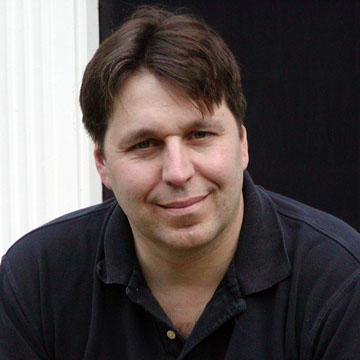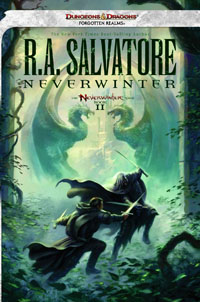|
an interview by Sto Austin with Acclaimed fantasy writer R.A. Salvatore is the author of more than 40 books, a gamer, a former bouncer, and a father of three. He is also a native citizen of the Red Sox Nation: he was born in Leominster, Mass., not far from this journal’s editorial offices, and lives there still. His novel Neverwinter, published in October 2011 as the second installment in the Neverwinter Saga featuring popular character Drizzt Do’Urden, debuted at number four on The New York Times' Best-Seller List. Clarion contributor Sto Austin spoke with Salvatore—about Bigfoot, Moby Dick, and a major misstep in Star Wars—following the author’s publicity tour for this latest book. AUSTIN: Your career seems to have struck a chord. What do you think accounts for your popularity as a writer? SALVATORE: I like my books to stand on their own. I’ve seen a lot of writers up at a podium, telling you how brilliant they are. I was at San Diego Comic-Con, sitting on a panel moderated by Mary Elizabeth Hart who runs Mysterious Galaxy, and who I love to death. She had all these intellectual writers on the panel, lecturing us. It was eight o’clock in the morning, I hadn’t had my coffee, and I was crushed when the panel starts discussing the Campbellian hero’s journey of the characters in each of their books. They go on and on, and my eyes are glazing over, and the rest of the audience isn’t doing much better. Finally, Mary looks at me and sees I’m completely tuned out. She tries to hit me with one of those ‘gotcha!’ moments, like I’m a kid passing love notes in class. She asks, ‘So Bob, what do you think?’ and I tell her, ‘I don’t know, I just make shit up and people like to read it.’ The audience just exploded with laughter, and the three guys sitting on the panel are shooting glances like darts at me. But if your book can’t stand for itself, what’s the point? I don’t like the idea that I have to be better than anybody else. That’s all garbage. Write your damn book and let the people reading it decide whether it’s good. What is it readers like about fantasy?
I love spending my Saturday afternoons watching all of those shows on the Discovery Channel that begin [in a low voice] ‘Some people believe…’ You know, where they’re looking for UFOs or Bigfoot or the Loch Ness Monster, or some other weird creature, you know, in some remote swamp in Arkansas [laughs]. I love those shows! Is it because I believe in that stuff? No. It’s because I want to believe. It’s the sweet mystery. Are people responding to a message in your writing? A comforting aspect of fantasy is that in these stories, one person can make a difference. One guy can pick up a sword and kill the dragon that’s harassing the town. In the real world, you have seven billion people, an economic system that nobody understands, millions of moving parts that you don’t even know about, wars killing people, drones killing people, and uprisings in countries that you didn’t even know existed. It’s really hard for one person to believe that he or she can make a difference in the vastness that is the modern world. In fantasy, you can. Is it a lot of pressure to create a story in which the circumstances of morality and fiction can be established believably
I’ve developed my writing style the same way anyone does by reading the masters, studying literature. Trial and error. You figure out what Shakespeare did, what Chaucer did, Dante, Mark Twain, Hemingway, James Joyce, all of them. How they used the rhythm of the words to pace the story, to create urgency in scenes, or to reveal the laid-back nature of the culture, as Faulkner did with his meandering writing. You learn all of it; understand it as best you can. Then you have to cram it all into the back of your head and go with what your gut tells you. That’s what it is to be a writer. I write detailed fight scenes because I had read other books that built up to them, then ended up just telling you the result instead of showing the fight itself. I like the pulse-pounding action of a good fight scene, but I never want to overwhelm the storytelling in one of my books. I don’t need that big Star Wars ending for every book. As far as learning how to craft a novel, a lot of it is instinctual. You have to understand the level of participation that you’re asking of the reader, which has changed dramatically over time. When Herman Melville was describing Moby Dick, what percentage of his audience had ever actually seen a whale? It was Melville’s job to dive deep down into the physical attributes of a whale and paint this incredible picture for his readers—and it’s also a good thing he was getting paid by the word [laughs]. Tolkein did pretty much the same thing with Smaug, but let’s face it: the fantasy genre has grown up. When you type the word ‘dragon,’ your reader already has the image in his head. You just have to shape it. These are aspects of storytelling that aren’t restricted to fantasy… All fiction accomplishes the same thing—trying to explore a piece of the human condition that particularly interests the author. That’s what fiction is, whether it’s fantasy, romance, or mainstream literature, that’s what we’re doing. We’re all exploring what it is to be a human being. Genre fiction readers have their choice of trappings. In fantasy, you have monsters and sword fights, in science fiction, you have speculations about where technology will take us in the future, in romance, the focus will be on the emotions pertaining to the bedroom, typically [laughs]. In any case, it gives the reader an idea of where the author might be going. If Margaret Atwood is writing a sci-fi fantasy story, how are you going to argue that that’s not as relevant to the times as a political thriller written by an insider? When I have time to read, I read a lot of political books, written from both points of view, right and left. And biographies, and historical novels, to learn about different parts of the world. One of the things with being a writer in a fantasy world where you have so much control is that you have to understand how societies interact.
It’s really hard for me to read fantasy while I’m writing, because it creeps in. I may steal an idea subconsciously, you know, someone else’s spell or something, and I don’t want to go down that road. So I try not to read fantasy while I’m writing. Though, I’m almost always writing now, so unfortunately, one of the prices of my success is that I don’t get to read fantasy books the way I used to. Though it isn’t uncommon for fantasy writers to borrow characters—or even entire worlds—from one another. So how do you react when you see someone else adapting ideas from your work? I’m mostly amused in seeing what others pull out of my books. I’m a firm believer that the only person who determines the relationship between a reader and a book is the reader of that book. There are places where I may object, and say, ‘Hey, you missed an important scene!’ But generally speaking, if I’m not involved, I just look at it with amusement. I didn’t find out that Drizzt was in Baldur’s Gate until I played it. When I saw him, I said, ‘Ohh, this guy looks familiar.’ I tried to kill him and get his stuff, and he wiped me out. It was fun. Do you have as much fun when you’re writing stories set in established worlds like Forgotten Realms, as when you’re writing about characters and worlds which are entirely of your own creation? When I wrote DemonWars, I was able to express myself on a greater scale because I had complete control over that world. When I write for Forgotten Realms, I tend to express myself on a more personal scale. With DemonWars, I had a hundred more moving parts to deal with—implications to society, implications to the church, the church’s implications to everything around it. I had to deal with all of those things on a bigger level involving multitudes of people, rather than just the Companions of the Hall and how they approach things. With Star Wars, the editing was much more forceful, and I had to really play by their rules. I didn’t know about Chewbacca's death when I signed the contract, but it was part of the deal. It wasn’t my choice—it came from on high. With Forgotten Realms, I know the boundaries, I stay within them, and the editors pretty much leave me alone. Sometimes they’ll tell me about something else that’s going on in their world, and tell me to take a look at it if they think it will fit in with my work. Other than that, I know the things they don’t want me to do, and the stories I’m telling don’t need to do that anyway. It really isn’t too different from the editing I get on my own IPs [intellectual properties].
Neverwinter was a bit different, because they asked me to work in a few things like details and locations to set up a new video game they were working on, but at their core the stories would have been exactly the same. Are there times when you are hesitant to yield to the editors when they make decisions about a world that you’re working on? I had to ask myself, after they advanced the world of Forgotten Realms a hundred years, ‘Do I really still want to play in this sandbox? Do I still see possibilities for Drizzt that are worth exploring?’ It was certainly not my idea to advance the Realms, and I actually didn’t agree with it, but it was their choice. Their world. Ed Greenwood created the Forgotten Realms, not R.A. Salvatore. [sighs] Yeah, that was forced on me. I was brought in when they had the discussion. They asked me my opinion, I gave it. They listened to some of it, not all, but it really wasn’t my place to say. These are things that happen, though. It’s not just Forgotten Realms. If you watch The Sopranos, in the early seasons, the World Trade Center is there. In the later episodes, it isn’t. Big things change in the world, just like they change in Forgotten Realms. In the end, I think the advancement worked out pretty well. I wanted to go in a certain direction with Drizzt that ended up being easier in this context than it would have been had the world not moved on. I would have found a way to do it anyway, but this made it easier. Now Drizzt is surrounded by people who don’t share his moral viewpoint. It has been a great way to introduce him to shades of gray, and have him become lost. It’s a chance for him to grow. It sounds like you’ve had very positive relationships with your editors, even if there were times you didn’t agree with their decisions. Every author needs a good editor. You forget things. Characters show up who died three chapters ago—it sounds ridiculous, but that’s the way it is! What do you think the role of editors will be in the future, as the publishing industry absorbs and responds to new technologies? I’m terrified the role of publishers in the age of e-readers will be greatly diminished. Everyone’s got a word processor now, and almost everyone thinks he or she can write a book. Now you’ve got all these books out there, and if there’s no hopper taking this jumble of books and narrowing it down, how will readers have any idea of what to find? What you’ll end up with is a very small number of go-to authors. The idea of breaking out new authors now is daunting to a publisher. How do you get through the noise? They’ve ripped the boundaries off with e-publishing. On the other hand, I understand the frustrations of a writer who wants to be self-published. I don’t even discourage it. What do you have to lose? You may see a few authors really break out this way, writers whose work was great, but who somehow never got an editor’s attention. But the practical question remains: how does a reader cut through the noise? _ _ R.A. Salvatore’s published works have sold more than fifteen million copies to date. His books set in the Star Wars universe and the worlds of DemonWars and Forgotten Realms are widely available in stores and the usual online vendors. If you’d like to learn more about his approach to writing, his current projects, and the development of his career, visit http://rasalvatore.com. _ _ Sto Austin earned a BA in Literature and Film from Marlboro College, after spending four years inflicting essays upon the undeserving faculty comparing Sophocles to James Cameron, Homer to Stephen King, and Shakespeare to George R. R. Martin. Although he grew up in Maine, Austin currently lives in Tallahassee and writes fiction while juggling stints as a waiter, chauffeur, and carnival worker. He recently completed his first novel, Sunset in the East. NB: This interview was edited for structure and length by staff editor Jenna Dee, who (full disclosure) remembers how when she was much younger Mr. Salvatore would be seated in the bleachers of the local skating rink, writing away, while she and his daughter Caitlin practiced with the rest of the Snowbirds youth synchronized ice skating squad. |
ISSN 2150-6795 |





